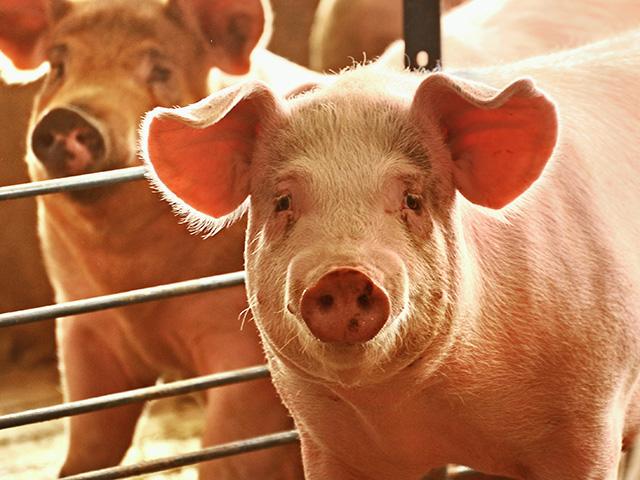California Pork Prices Spike on Prop 12
Pork Prices Rose 20% on Average in California After July 1 Last Year
LINCOLN, Neb. (DTN) -- California consumers are paying higher pork prices than the rest of the country following the full implementation of the state's animal welfare law Proposition 12 on Jan. 1, 2024. This is according to a new analysis conducted by USDA economists on behalf of the Giannini Foundation of Agricultural Economics at the University of California.
Last year the Supreme Court issued a ruling in favor of the state on a lawsuit filed by the National Pork Producers Council. The ruling effectively gave California the go-ahead to fully implement restrictions on the sale of pork in the state only from facilities compliant with pen-size restrictions established by Proposition 12.
Throughout the legal battle, which ended up at the Supreme Court, pork and other industry groups warned California consumers would pay more for pork unless the law was tossed.
PORK PRICES ROSE
"This analysis of preliminary data indicates that pork prices of products in California that are impacted by this new policy rose, on average, 20% after July 1, 2023," the new study said.
"This varies by product, with pork loins experiencing the largest impact with a 41% increase in price due to this policy. As expected, the products that are not covered by Prop 12 did not see a significant relative price change. While we do find significant impacts following the partial implementation and first month of full implementation, there is still uncertainty regarding the long-term impact on California's retail pork prices."
The study was led by USDA personnel including Chief Economist Seth Meyer; Shawn Arita, senior economist at USDA; and Hannah Hawkins, a visiting scientist in the office of chief economist at USDA.
The economists used Circana retail scanner data in the state to analyze the effects of Proposition 12.
PORK CONSUMPTION DECLINED
They also found the state's share of national fresh pork consumption "significantly declined" falling from its historical 10% to 8% as of January 2024.
Since the Supreme Court's ruling last year, federal lawmakers from agriculture states have been pushing for the passage of the "Exposing Agriculture Trade Suppression Act," or EATS act.
P[L1] D[0x0] M[300x250] OOP[F] ADUNIT[] T[]
The bill introduced in both the U.S. House of Representatives and the U.S. Senate, would essentially prevent states from passing laws that impede trade within the U.S.
The study found that Proposition 12 has led to a decrease in the amount of North American pork, including in Canada, that complies with the law.
"Based on California's consumption of pork produced in the unified North American market, which includes Canada and pork exports, about 8% to 9% North American sows would need to meet Prop 12 standards," the study said.
"The costs of compliance for sows, the certification costs and added costs for assuring traceability through the supply chain raise costs of the approximately 60% of pork that comprises covered products."
WHEN PRICES BEGAN TO CHANGE
The authors said the average retail pork price in the U.S. was usually slightly above the California weekly average retail price during 2022 and the first half of 2023.
That began to change starting in July 2023.
"The prices, in the sample of stores for which data were available, were declining gradually during this period of moderating hog and pork prices generally," the study found.
"Around July 1, 2023, the national prices began rising gradually, but the California prices jumped remarkably from late June through early August. In late July, the California average was more than $1 per pound above the national average. California prices remained about $0.85 higher than the national average in early August, but then fell by $0.60 in one week. For the weeks from mid-August through early December, the California average prices were about $0.20 higher than the gradually increasing national average."
PRICE SPREAD WITH REST OF COUNTRY
The authors said the price spread between California and the rest of the country appears to remain stable. California's pork loin prices remain "significantly higher" than the rest of the U.S., exhibiting "very stable spreads" throughout January 2024.
"However, the price gaps for ribs and bacon appear to have slightly widened since full implementation, potentially indicating growing pressure from limited supply," the study said.
When it comes to bacon in California, for example, the state's price rose $1.04 per pound more than for the rest of the U.S.
"Earlier estimates anticipated long-run equilibrium increases of around 7.7%, but our analysis reveals increases ranging from 9% to 41% and an average of 20% for covered products," the USDA authors said.
Before Proposition 12, California typically purchased about 10% of the U.S. fresh pork supply with seasonal variations.
"However, following implementation of Prop 12, this share dipped significantly, falling to below 7% in July 2023, and remained below the normal share throughout the rest of 2023," the study said.
"January 2024 indicates an even greater decrease, although it is too soon to determine what to expect following the full implementation."
Read more on DTN:
"Ag, Interstate Commerce and Prop 12," https://www.dtnpf.com/…
"Risks and Complication of Prop 12," https://www.dtnpf.com/…
Todd Neeley can be reached at todd.neeley@dtn.com
Follow him on X, formerly Twitter, @DTNeeley@DTNeeley
(c) Copyright 2024 DTN, LLC. All rights reserved.






